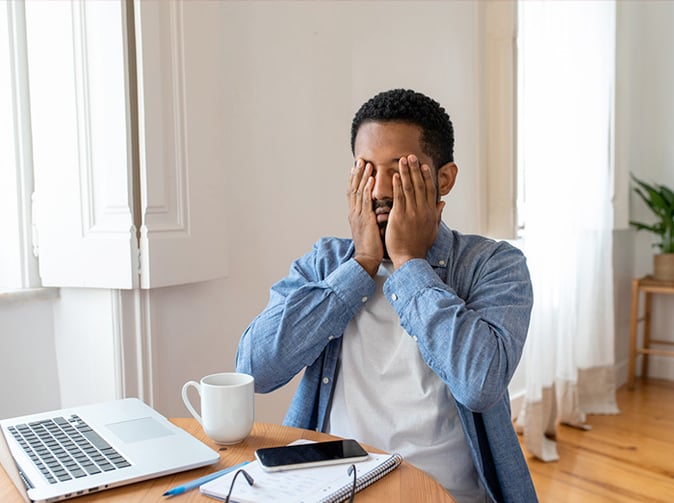Are You Tired of Being Tired? How an At-Home Sleep Test Can Diagnose Sleep Apnea
Tired of Waking Up Tired? You’re Not Alone.
Do you wake up groggy, with a dry mouth or a headache? Struggle to focus throughout the day? If you feel like you’re always running on empty—despite getting what seems like a full night of sleep—it’s time to dig deeper. You could be suffering from sleep apnea, a common but underdiagnosed condition that disrupts your rest without you even knowing it.
The good news? You don’t need to check into a sleep clinic to find out. A simple, accurate at-home sleep test could be your first step toward better sleep—and better health.

What Is Obstructive Sleep Apnea (OSA)?
Obstructive sleep apnea (OSA) is a sleep disorder where your breathing repeatedly stops and starts throughout the night due to airway blockages. These interruptions force your brain to jolt you out of deep sleep just enough to resume breathing—without fully waking you.
Over time, these repeated disruptions:
-
Prevent deep, restorative sleep
-
Cause chronic fatigue and brain fog
-
Increase your risk for serious health issues like high blood pressure, heart disease, and type 2 diabetes
Many people with OSA don’t realize they have it—they only know they’re constantly tired.
How Do You Know If You Have Sleep Apnea?
If you’re wondering whether your fatigue is due to sleep apnea, here are some signs to watch for:
-
Loud snoring
-
Gasping or choking during sleep
-
Frequent nighttime awakenings
-
Morning headaches
-
Daytime drowsiness
-
Trouble concentrating
There’s also central sleep apnea (CSA), which is less common and caused by your brain failing to send the signal to breathe. While different in cause, both forms of sleep apnea lead to similar symptoms—and both require a proper diagnosis.
Why Choose an At-Home Sleep Test?
A home sleep test is a non-invasive, convenient, and cost-effective way to detect sleep apnea—especially moderate to severe cases. At Sleeptest.com, we offer a two-night testing kit with a 98.2% success rate in capturing the data needed for a reliable diagnosis.
You’ll receive:
-
Easy-to-follow instructions
-
Comfortable equipment for home use
-
Professional analysis of your results
-
A faster path to treatment
Unlike full sleep studies at clinics (which can take months to schedule), an at-home sleep test delivers the answers you need quickly—so you can start sleeping better sooner.
Treatment Options After a Sleep Apnea Diagnosis
Once diagnosed, treating sleep apnea is not only possible—it can be life-changing. Here are some of the most effective ways to manage obstructive sleep apnea (OSA):
Lifestyle Changes
-
Lose weight to reduce airway blockage
-
Sleep on your side to prevent your tongue from collapsing backward
-
Avoid alcohol and inflammation-causing foods
Medical Devices
-
Oral appliances that keep your airway open
-
CPAP machines (continuous positive airway pressure) that provide gentle airflow to keep your airway clear overnight
Surgical Options
In some cases, structural issues in the throat or nose may require surgical correction.
For central sleep apnea, working with a healthcare professional is essential to manage the neurological component of the disorder.
The Hidden Risks of Untreated Sleep Apnea
Sleep apnea isn’t just about snoring or feeling tired. Left untreated, it can lead to serious long-term health consequences, including:
-
High blood pressure
-
Heart disease and stroke
-
Type 2 diabetes
-
Depression and anxiety
-
Cognitive decline and memory issues
Getting a sleep apnea diagnosis isn’t just about better sleep—it’s about protecting your health for years to come.
Get the Rest You Deserve—Starting Tonight
Feeling exhausted isn’t just frustrating—it’s a signal from your body that something isn’t right.
If you’re tired of being tired, don’t wait. Take the first step today with an at-home sleep test from Sleeptest.com.
Easy. Accurate. Affordable. Delivered to your door.
Order Your Home Sleep Test Now
And finally wake up feeling rested, recharged, and ready for your day.

Feeling tired all the time, even after a full night’s sleep? You might be suffering from sleep apnea. Discover how an at-home sleep test can help diagnose the root cause of your fatigue—and get you back to feeling like yourself.

Spring is here—and so is the pollen. For the millions dealing with seasonal allergies, the symptoms can be more than just annoying. And if you also have sleep apnea, those stuffy nights and restless sleep can get even worse.
Let’s take a closer look at how spring allergies and sleep apnea affect each other—and what steps you can take to sleep more comfortably.




